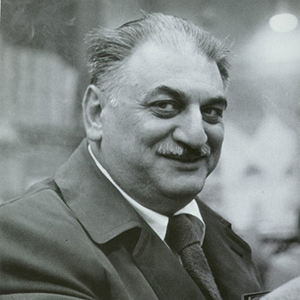
Moe Asch ranks as one of the preeminent figures in the history of folk music, including folk blues, thanks to his tireless work in releasing over 2000 albums on Folkways Records in addition to earlier 78rpm releases on Asch, Disc and other labels. The amazing scope of his catalog came to include ethnic music from all over the world in addition to spoken word, sounds of nature, and other esoteric audio documentation, all products of Asch’s mission to fill voids left by the commercial record labels. His 1940s recordings of Huddie Ledbetter (Lead Belly) and Woody Guthrie are especially treasured releases in a trove that defined the burgeoning folk movement of the era in a way no one else in the record business did. When he switched from manufacturing 78rpm singles to 33rpm long-playing albums, the 1950 Folkways 10-inch LP Take This Hammer and a series of Lead Belly memorial albums that followed were among the first recordings by a blues artist issued in the new format. Asch and Folkways ensconced a position in the forefront of the folk-blues field with further releases by Josh White, Sonny Terry and Brownie McGhee, and Big Bill Broonzy,
Moses “Moe” Asch, the son of noted Yiddish writer and lecturer Sholem Asch, drew upon inspirations ranging from folklorist John Lomax’s work to meeting and recording Albert Einstein, who was making speeches in Yiddish made for broadcast in Europe. Born in Warsaw on December 2, 1905, Asch lived in Poland and Chatillon-sur-Seine, France, before the family emigrated to America. Studying electronics in Germany and working as a radio and audio technician in New York led him to start recording Jewish cantors and other singers, speakers and musicians who had fallen off—or were never on–the radar of the big record labels. He first recorded Lead Belly in 1941 performing children’s songs that were issued on a three-record set on the Asch Records album Play Parties in Song and Dance, as sung by Lead Belly, back when the term “album” originally referred to a binder with pages or sleeves for multiple photographs or records. Further, Asch sets followed by Woody Guthrie, Burl Ives, Josh White, boogie pianist Meade Lux Lewis, poet Langston Hughes, and jazz greats Mary Lou Williams, Art Tatum, and others.
After partnering with Stinson Records on some releases, Asch launched the Disc label in 1946 for more album sets and singles of folk, jazz, gospel, calypso, and blues, most notably by Lonnie Johnson. Other Asch-owned or -associated imprints included Solo, Cub, Ethnic Library, RBF and Broadside. Pete Seeger, the New Lost City Ramblers, the Terry-McGhee blues duo, and African American singer-storyteller Ella Jenkins became prolific artists in the Folkways catalog. The label’s blues and gospel roster numbered Elizabeth Cotten, Reverend Gary Davis, Champion Jack Dupree, Honeyboy Edwards, Memphis Slim, Little Brother Montgomery, Brother John Sellers, Henry Townsend, Big Joe Williams and many more. Field recordings gathered by Frederic Ramsey, Harold Courlander, Sam Charters, and others documented traditional African-American music from Alabama, Mississippi, Louisiana and elsewhere. The educational value of the Folkways albums was complemented by detailed liner note inserts, another example of Asch’s pioneering vision.
Along the way, Asch’s output on various labels also encompassed music by Bob Dylan (under the pseudonym Blind Boy Grunt), the anarchic underground group The Fugs, the avant-garde compositions of John Cage, and reissues of vintage blues, jazz and country, including the influential Anthology of American Folk Music compiled by Harry Smith and The Country Blues compiled by Sam Charters.
Often described as irascible, stubborn and tight with his money, Asch devised his own business scheme to move a flow of records that often had little commercial potential by marketing to ethnic communities, schools, and collectors and dealers of folk, jazz, and world music. Wider distribution for some albums came through Verve Records in 1965, but the Verve Folkways logo lasted only two years. Asch made sure that every Folkways record stayed in print, a policy that continued when the Smithsonian acquired his catalog after his death on October 19, 1986. Now known as Smithsonian Folkways, the catalog has continued to grow with new recordings, and CDs can be ordered by clicking here.
